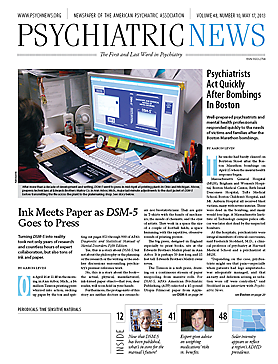On April 17, two days after the Boston Marathon bombings, an explosion of a different kind ripped through a fertilizer plant and distribution center in the town of West, Texas.
At least 14 people died, including 10 volunteer firefighters. Another 200 people in the town were injured. The blast left a 93-foot-wide, 10-foot-deep crater and destroyed a nearby school, apartment complex, and nursing home.
Authorities are still investigating the cause of the fire that set off the explosion. An estimated 270 tons of ammonium nitrate fertilizer were stored at the plant, according to news reports.
The town, near Waco, was founded by Czech immigrants in the 1880s and has a population of 2,800.
“This is a close-knit, stoic, hard-working community where people work together and help each other out,” said Debra Atkisson, M.D., of Fort Worth, the immediate past president of the state district branch, the Texas Society of Psychiatric Physicians (TSPP).
The consequences will be felt throughout the community, she said. “Close to 10 percent of the town were killed or injured,” noted Atkisson in an interview after a meeting of the TSPP’s executive counsel in Austin.
Atkisson is spearheading the district branch’s response to the blast. She and colleagues from the TSPP coordinated with the Red Cross in the immediate aftermath of the explosion. They also will be contacting local school authorities with an offer to train teachers to identify children who might need emotional help as a result of the explosion.
In addition, TSPP members from nearby Waco, led by J. Clay Sawyer, M.D., will be in touch with local health clinics to identify needs and offer assistance to family doctors.
A retired psychiatrist, Sawyer chairs the board of the Family Health Center in Waco, a federally qualified health center that operates 14 clinics.
“Family practitioners will have the first contact with the people of West,” Sawyer told Psychiatric News. “Volunteers from the TSPP will be available to consult with the family practice physicians at the clinics. That effort may expand in the future, depending on needs.”
He emphasized that the TSPP was not going to descend in force on the town. People in West tend to close ranks and help each other in times of trouble, said Sawyer.
“And they are doing that quite well now,” he added. “Meantime, we are helping to meet their basic needs, like food and shelter.”
Perhaps one of the earliest ways to help doesn’t involve psychiatry, at least not directly, Sawyer suggested. Three of the town’s four ambulances were destroyed in the explosion. The TSPP is looking into obtaining a grant from APA to help purchase new ambulances.
“That would tell the people that we care about their medical needs,” he said. “It would be a gift never to be forgotten by the people of West, and it might make them more open to therapy when they were ready.”
Overall, psychiatrists in Waco (APA lists nine members there) and across Texas must continue to learn what the people of West feel is best for them as they recover from the blast’s devastation. “We will be ready to change with the need,” said Sawyer. “We have to be prepared to be resilient ourselves.” ■
